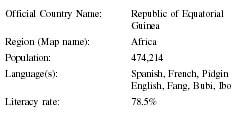Equatorial Guinea
Basic Data

| Official Country Name: | Republic of Equatorial Guinea |
| Region (Map name): | Africa |
| Population: | 474,214 |
| Language(s): | Spanish, French, Pidgin English, Fang, Bubi, Ibo |
| Literacy rate: | 78.5% |
Background & General Characteristics
In Equatorial Guinea, a limited number of mostly government-controlled media outlets operate in Spanish, French, and local dialects from bases in the island capital, Malabo (Bioko), and the mainland city of Bata (Rio Muni).
Formerly Spanish Guinea, the Republic of Equatorial Guinea (República de Guinea Ecuatorial) is a small coastal country that gained its independence and current name in 1968. Its 1991 constitution was amended in 1995. Mismanagement and questionable elections in the 1990s are parts of a history of national instability.
On World Press Day 2002, the Paris-based group Reporters without Borders listed Minister Teodoro Obiang Nguema among thirty "predators" worldwide whose actions threatened the principle of a free press.
The population, under a half million, is heavily Roman Catholic and forty-seven percent urban; however, Malabo and Bata had fewer than 30,000 residents each in 1995, following the country's financial collapse and the resulting exodus of many Europeans.
Principal languages are Spanish and French—both official—and native dialects including Fang. Pidgin English operates in commerce. In the mid-1990s, the country had the second highest male literacy rate in Africa, following Zimbabwe.
In 1997, after a rift with Madrid, the government ordered state-run media to use French exclusively.
Media Activity
Newspapers that have been published irregularly and in small press runs (of perhaps one or two thousand copies) at Malabo are Ebano and Unidad de la Guinea Ecuatorial, both in Spanish. In Bata, Poto Poto has appeared in Spanish and Fang. The first government-recognized private newspaper, the weekly El Sol , was started in 1994. Spain's Agencia EFE, operating at Malabo, is the only news agency.
Radio Nacional de Guinea Ecuatorial (RNGE) supervises broadcasts in Spanish and local languages over two radio stations at Malabo and one at Bata. Televisión Nacional transmits over a single, government-controlled channel at Malabo. In the 1990s a commercial radio network was operating, and cultural broadcasts were produced with Spanish collaboration. In 1995 citizens owned about 170,000 radios and 4,800 television sets.
Statistics for 2000 show one Internet service provider and about five hundred subscribers.
Significant Dates
- 1994: First government-recognized private newspaper appears.
- 1997: Government orders state-run media to use French exclusively.
- 2002: Reporters without Borders calls Guinean minister a "predator" on the press.
Bibliography
Banks, Arthur S., and Thomas C. Muller, ed. Political Handbook of the World, 1999. Binghamton, NY: CSA Publications, 1999.
The Central Intelligence Agency (CIA). The World Fact-book 2000 . Directorate of Intelligence, 7 May 2002. Available from http://www.cia.gov/ .
Turner, Barry, Ed. The Statesman's Yearbook: The Politics, Cultures, and Economies of the World, 2000. New York: St. Martin's Press, 1999.
World Almanac and Book of Facts, 2002.
New York: World Almanac Books, 2002.
Roy Neil Graves
I'd like to know which are the most important tv channels of Equatorial Guinea.
Thank you!
Marta
Please give me an update on politics and economics on the nation